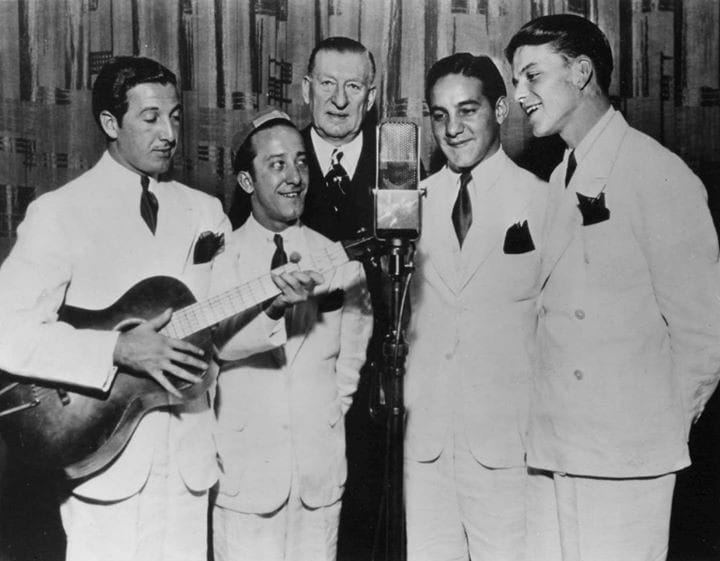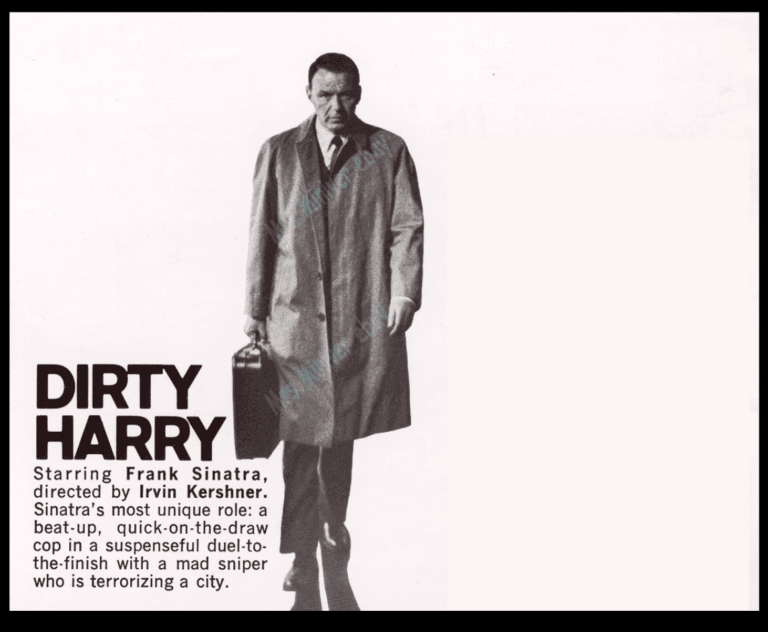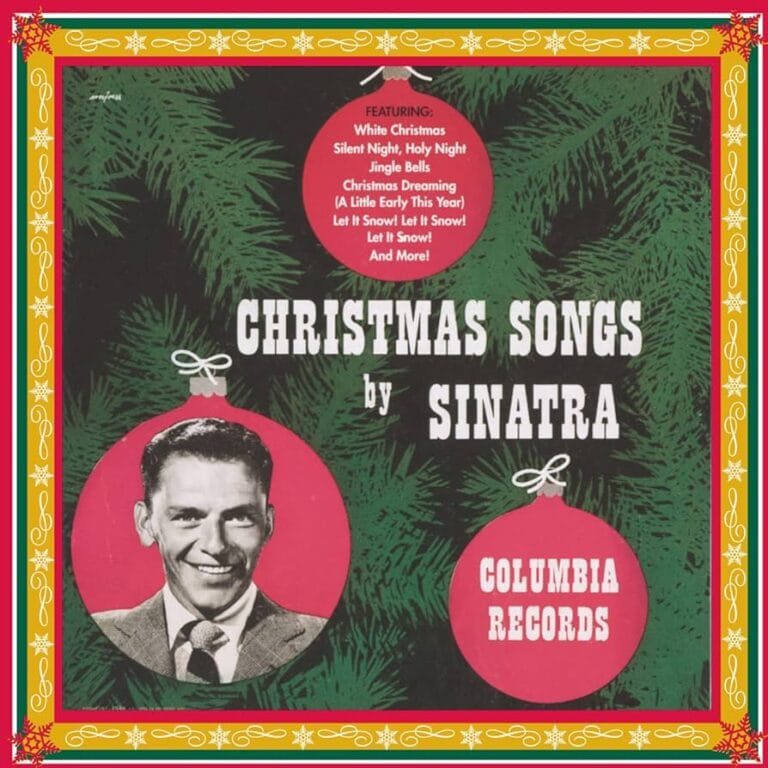
SHINE: SINATRA BEFORE SINATRA
By Mahnuel Muñoz
He said that as a child it crossed his mind to be an engineer, to design and build bridges, tunnels and highways, but history has left testimony to young Frankie’s little interest in studies, so it is possible that such a statement is a license. that the star took to add cachet to the story of his early years. It is true that from childhood his senses were filled with a passion for music, which would allow him, in another way, to establish links between all human beings.
Martin Sinatra and Dolly Garaventa, the child’s parents, wanted their son to become a man of profit, with a suit, briefcase and “Mr.” in front of his last name, and at first they opposed Frankie’s fantasies.
They were a couple of humble Italian immigrants who, by working hard and making good contacts, achieved a wealthy position in Hoboken, New Jersey. Martin, a tough and pragmatic man, was a boxer, firefighter and tavern keeper, and Dolly, visceral and expansive, managed to relate to the city’s political sphere, although she also made huge profits by performing illegal abortions.
Frankie had started singing on the piano in the family tavern after falling in love with music listening to orchestras, opera singers and the first crooners on the receiver in his room; He wished that one day it would be his voice that came out of those speakers.
At the age of twelve he entertained classmates and teachers at the David E. Rue Institute, imitating the popular figures of the time. In adolescence, among the typical pranks and brawls with other kids in the neighborhood, he began to seriously explore his singing voice, inspired by Rudy Vallee, Russ Columbo and, above all, Bing Crosby. He was pleased to hear his own vocal timbre, pleasant and well intoned, and he enjoyed the applause as much or more, an expression of affection that made him forget the lonely moments he spent in his early years as the only child of a couple who lived to work.
Frankie daydreamed of a bright future in which he would be a singing star, with his name decorating theater marquees and a crowd falling at his feet. These chimeras often caused him to neglect obligations in the real world and he ended up being expelled from classrooms for bad behavior.
It was a while before his parents found out, and it was a blow to their hopes of seeing him become the first college graduate in the family. However, given the boy’s firm conviction to dedicate himself to singing, Dolly ended up supporting him; As we will see, his role was axial during Sinatra’s first steps in show business.
Martin was not so understanding and told him that if he didn’t want to study, he would have to get a “real” job and forget about all that nonsense about being a singer.
Reluctantly, Frankie dedicated himself to unloading trucks, performing tough and dangerous jobs in New Jersey shipyards, and being the “jack-of-all-trades” at The Jersey Observer newspaper. But it wasn’t long before he left his job or was fired. He had his head and heart in music; Furthermore, Hoboken was full of bands that filled every corner of the city with songs. Frank wanted to be around musicians, learn, talk, sing with them. He had an old second-hand Chrysler with which he chauffeured the artists, and from time to time they would let him sing a song or two. When he was able to obtain several musical arrangements, some groups began to look at him with better eyes. He sang, amplifying his voice with a megaphone and had to deal with some scoundrels who threw coins into the cone for him to swallow. Frankie was holding on. He knew that the future had something great for him.
Martin, tired of his son’s inability to work, kicked him out of the house, and the future Voice had to stay in a room in New York while he looked for a job, but he had no luck and returned home shortly after.
Dolly continued to act as her son’s patron and bought him a portable sound system for sixty-five dollars (about nine hundred euros today), which allowed him to sing more frequently with small bands at nightclubs, roadside restaurants, and party rallies. Democrat and Hoboken Sicilian Cultural League meetings (1).
He performed Bing Crosby songs like “Just One More Chance” and “I Found A Million Dollar Baby (In A Five And Ten Cent Store”). Sometimes he received a few dollars, other times he was given sandwiches, cigarettes or simply nothing. And? The fundamental thing for him was always to be active and practice as much as possible, to be prepared when “the big day” arrived.
In the summer of 1934 he met Nancy Barbato, his future wife, and they became lovers. She said that he conquered her by singing and playing the ukulele. They had to meet secretly, because since Frankie didn’t have a serious job, Nancy’s father didn’t want him near his daughter. They drank smoothies, had picnics on the beach, and went to concerts. It is said that it was during a Bing Crosby recital when Sinatra became clear not only that he would be a singer, but that he was going to far surpass Crosby. He was not looking to be just another imitator, like the rest of the applicants in the neighborhood. He confessed his dreams of greatness to Nancy, and she promised to support him unconditionally.
At that time, radio was the country’s main entertainment and means of communication.
His next objective was to get his head into the studios of some local stations and fulfill that childhood dream of being the voice that came out of the speakers. He managed to have his own unpaid program on WNEW, in which he sang in the company of one or more musicians. He also showed interest in venues that broadcast their performances live over the airwaves. One of those venues was the Rustic Cabin, a roadside bar in Englewood Cliffs, a thirty-minute drive from Hoboken.
James Petrozelli, Patrick Principe, and Fred Tamburro formed a musical group called The Three Flashes, and Frank was after them after learning that they had been hired to sing weekends at the Rustic Cabin. The trio accepted him not because of his qualities, but because he had a car, and he would be very useful to them as a driver. It also helped that Dolly kept nagging them.
Frank joined the group in time to film a couple of short films for the popular talent scout Edward “Major” Bowes (1874-1946), who after seeing the filming auditioned them for the radio contest “The Major Bowes Original Amateur Show.” , the most popular program of the time, an equivalent to current “talent shows” like “The Voice” or “Got Talent.” Petrozelli, Principe and Tamburro conspired to get Sinatra off their backs and he found out. The plot was quickly dissolved thanks, again, to Dolly’s intervention.
The singers were summoned to audition at Bowes’ office in the Chrysler Building in New York. They were renamed The Hoboken Four. They performed for Bowes “The Curse Of An Aching Heart”, an old tune premiered by Will Oakland in 1913. The impresario liked the group but not the song, and asked them to change it. Frank proposed “Shine”, a song that had recently been a hit for Bing Crosby, backed by The Mills Brothers. Sinatra sang the lead vocals and the rest served as the chorus. This piece was chosen for the competition. The trio of friends must not have been very amused that that Sinatra kid had so much prominence.
The song perfectly captures the personality and effigy traits of young Frankie, as well as his relentless optimism in the face of the obstacles he encountered on his path to stardom:
“Just because my hair is curly
Just because my teeth are pearly
Just because I always wear a smile
And I like to dress in the latest fashion.
Because I’m glad to be living
And I take these problems with a smile.
Just because my color is dark
That’s the difference, maybe, why they tell me:
Shine, moderate your sadness
Why not shine?
Start with your shoes
Make every place shine,
make it look new
Make your face shine;
I want to see you wear a smile or two
Why don’t you shine your “this and that”?
You will find that everything will work out
People will make you shine
Everyone is going to greet you
“You will make the whole world shine”
On the night of Sunday, September 8, 1935, Frank and his companions were waiting for their turn to perform before more than five thousand people at the emblematic Capitol Theater in New York, one of the main temples of entertainment in the city. Millions more from their homes listened to the broadcast on CBS.
Nerves took their toll on everyone present; Frankie’s knees were shaking uncontrollably, and even the weathered Major had a few extra whiskeys to calm himself down.
After being announced by Bowes, The Hoboken Four came out on stage and introduced themselves. Fred Tamburro took the lead and told what each one did; When it came time to talk about Sinatra, he simply said: “Oh, this guy here has never worked,” adding another note to the constant humiliation to which he was subjected out of pure jealousy.
But at the moment of singing, Frankie made up for it; Despite his youth and trying to sound similar to Crosby, he already showed some of the unmistakable qualities of his style (2).
Both the show’s “applause” and listener calls awarded The Hoboken Four first prize: a six-month contract to tour with Bowes.
The experience ended up being more arduous than glamorous. They traveled throughout the country. The pay of $75 a week (more than $1,000 in today’s dollars) was more than any of them had earned, but with such a magnificent sum they had to pay for all their needs during the tour.
It became evident, from concert to concert, that Frank had a special talent, superior to that of his peers combined. When he was asked to perform solo at a club in Oakland, he went on stage to sing without prior rehearsal. The Three Flashes’ resentment towards Frank did not stop growing. Behind the scenes, the young man received insults and physical attacks.
As the years went by, Petrozelli recognized Sinatra’s talent: “He got so good after just a couple of months on tour that with the bus full of people talking, making out, reading—everything people do on the bus-, Frank would start singing from somewhere in the background and everything would stop to listen to him… He put his heart and soul into it. “The boy was really good.”
“Frank was the best of the bunch,” said a former member of Bowes’ team. “After the show, people would gather behind the stage… They would ask the others to sign one or two autographs, but Frank would practically get destroyed. He had to get rid of the most beautiful women you’ve ever seen. Everything “What those women wanted was to get into bed with Frank Sinatra.”
This popularity with women was not well received by his group mates. Sometimes they came to blows with each other.
Three months later, Sinatra resigned and returned to New Jersey. The reason he gave was that he was homesick, but the truth is that the atmosphere was unbreathable and he was not interested in being part of a group, but rather excelling as a solo vocalist. The recitals gave him the opportunity to thoroughly work on the interpretive nuances and body language that would make him a legend.
The rest of the group finished the tour but broke up shortly after. Two of them worked as waiters and Tamburro dedicated himself to selling cars for a time. When Sinatra became famous and Tamburro asked him for a job, Frank offered to hire him as an assistant, something Tamburro rejected.
Frankie’s return to Hoboken meant meeting the same challenges as always. He again suffered his father’s reproach for having left another job and had to knock on the doors of clubs and radio stations to continue singing until something or someone lit the fuse of opportunity.
Despite the unhappy ending, Sinatra remembered that first tour as the experience that made him stick to singing “as a job and a vital ambition.”
ANNOTATIONS
(1) Nick Sevano, a close friend and confidant of Frank, wrote a book titled “Sinatra: His Story From An Insider” (2013) in which he tells a multitude of intimate anecdotes about the artist that did not appear in previous biographies and that in some cases They contradict the official account of the events. An example of this is the supposed true origin of Sinatra’s first sound equipment, which was stolen from a neighboring engineer. According to this version, when Frank’s parents discovered the crime, they paid the neighbor the price of the equipment.
(2) The recording of “Shine” from that day is the only sonic witness to Sinatra’s time as a member of The Hoboken Four. It has been published on different pirated and official albums over the years, among which I recommend the four-CD box set “A Voice On Air” (Columbia Legacy, 2015), which compiles songs recorded over twenty years of radio performances radio.
If you want to visit more articles about the life of Frank Sinatra enter the following Frank Sinatra Radio 24h link: https://sinatraradio24h.com/category/articles/
We remind you that you can also listen to Sinatra Radio 24 hours on your mobile phone by downloading our free applications for Android in the Play Store https://play.google.com/store/apps/details?id=sinatra.radio24h for iPhone in the Apple Store https://apps.apple.com/app/sinatra-radio-24h/id6599859344






